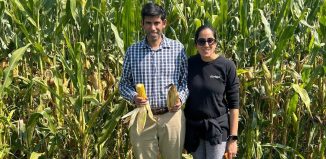Four SBU researchers receive NSF Career Awards
This is the second part of a two-part series on four Stony Brook University researchers who recently received an NSF Career Award. Designed to give researchers in the early part of their careers a financial boost before they compete against established scientists for the same dollars, the award funds projects, allows the scientists to expand their educational goals and offers recognition.
Last week, the Times Beacon Record Newspapers featured questions and answers with Radu Laza and Jonathan Rudick. This week, the paper will have insights from Alex Orlov and Emre Salman.
Alex Orlov
TBR: Are you excited to win this award?
Orlov: This was absolutely delightful news. Receiving this award, especially just before significant budget cuts to science, is even more amazing.
TBR: What will these funds enable you to do? Will you hire anyone new? Will you do more teaching?
Orlov: These funds will have a huge impact on my research focused on sustainable energy. It will also allow us to start new collaborations with Brookhaven National Lab and with other groups outside Stony Brook (University). I expect to hire several undergraduate and graduate students, who will be working on this project. There will be also a very significant impact on undergraduate and graduate teaching here.
Almost 80 graduate and undergraduate students are taking my courses and this project will allow me to introduce several innovative case studies based on this funded project into the classroom. We are also planning to develop new teaching techniques for engineering courses to help students (high school and university ones) to educate them on designing better consumer products while protecting the environment.
TBR: Is there anything new in your lab since we spoke? [The Times Beacon Record profiled Orlov on Dec. 18.]
Orlov: [He was named a fellow of the Royal Society of Chemistry in Britain in February.] The fellowship is something very exciting. There are also several interesting projects I am doing in collaboration with my colleagues (I am the principal investigator, but a significant player), such as developing a new computer game to educate students on environmental topics. There is a paper which was just accepted where we found a better way to get hydrogen fuel from water.
Emre Salman
TBR: How would you characterize the scope of your research?
Salman: Our research activities focus on high performance and energy efficient integrated circuits. We develop design techniques for next generation microprocessors, mobile computing devices as well as communication chips. We also investigate emerging integrated circuit technologies to overcome the fundamental limitations of current electronic systems such as high power consumption. At the NanoCAS Lab, our workstations are equipped with the latest electronic design automation software that allow us to verify our algorithms, models and design techniques.
Our ultimate objective is to develop future integrated circuits that are more portable, can interact with the environment, consume low power, yet still offer significant computing capability.
TBR: How will you use the funds from the award?
Salman: The NSF Career funds will support between one and two Ph.D. students in my research group (NanoCAS Lab) for five years. Part of the funds will be used to fabricate and test a three-dimensional integrated circuit to demonstrate and validate our methodologies. Furthermore, a scholarship will be available to an undergraduate student each year. Our objective is to provide undergraduate students with real research experience in our lab. These research activities will be integrated with multiple educational initiatives such as developing new course modules and outreach events for high school students within Long Island.
TBR: What would you tell those who are considering a career in research?
Salman: I would encourage them. It is fascinating to spend time on something that is not yet known by anybody. The hard part is to ask the right questions. If the questions are right, I believe the answers are likely to come, even though it may take some time. It is also very rewarding to share these experiences through teaching.
TBR: Where do you live?
Salman: I have been on Long Island since September 2010 and currently live in Sound Beach. I grew up in a small town on the Mediterranean coast in Turkey, so I enjoy being close to water. I like the nature of Long Island, hiking trails and its close proximity to New York City.






